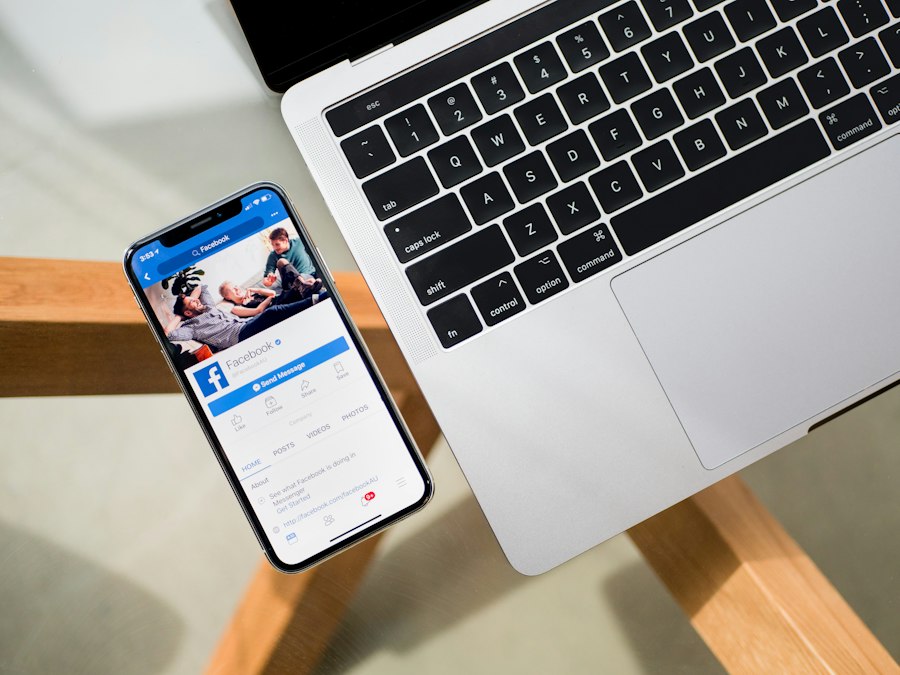Artificial intelligence (AI) has become an integral part of many industries, and advertising is no exception. AI refers to the simulation of human intelligence in machines that are programmed to think and learn like humans. In the context of advertising, AI can be used to analyze vast amounts of data, identify patterns, and make predictions, enabling advertisers to create more effective and efficient campaigns.
The impact of AI on advertising is significant. It allows advertisers to target specific audiences with personalized messages, optimize ad campaigns in real-time, and even create ad copy and creative elements. By leveraging AI technology, advertisers can improve their targeting, increase their return on investment (ROI), and ultimately drive better results.
Key Takeaways
- Artificial intelligence plays a crucial role in modern advertising, particularly in Facebook Ads.
- Facebook Ads have evolved from static to dynamic advertising, thanks to AI.
- AI helps Facebook Ads to target the right audience, increasing efficiency and effectiveness.
- Machine learning personalizes Facebook Ads, while AI optimizes ad campaigns in real-time.
- The future of Facebook Ads includes AI-powered chatbots and voice assistants, but ethical considerations must be taken into account.
The Evolution of Facebook Ads: From Static to Dynamic Advertising
Facebook has been at the forefront of digital advertising for over a decade. In its early days, Facebook ads were primarily static, consisting of text and images. However, as technology advanced and user expectations evolved, Facebook introduced dynamic advertising.
Dynamic advertising allows advertisers to create personalized ads that are tailored to each individual user based on their interests, demographics, and behavior. This shift from static to dynamic advertising has been made possible by AI technology. AI algorithms analyze user data in real-time to determine the most relevant ad content for each user.
How AI Helps Facebook Ads to Target the Right Audience
One of the key benefits of using AI in Facebook ads is its ability to analyze vast amounts of user data and identify target audiences. AI algorithms can process data from various sources, such as user profiles, browsing behavior, and social media activity, to create detailed user profiles.
These user profiles enable advertisers to target specific audiences with precision. For example, an advertiser selling athletic shoes can use AI-powered audience targeting to reach users who have shown an interest in fitness or sports-related content. By targeting the right audience, advertisers can maximize the effectiveness of their ads and increase their chances of converting users into customers.
The Benefits of Using AI in Facebook Ads: Increased Efficiency and Effectiveness
| Metrics | Description |
|---|---|
| Click-through rate (CTR) | The ratio of clicks to impressions, measures the effectiveness of an ad in generating clicks |
| Conversion rate | The percentage of users who take a desired action after clicking on an ad, such as making a purchase or filling out a form |
| Cost per click (CPC) | The amount an advertiser pays for each click on their ad |
| Return on ad spend (ROAS) | The revenue generated from an ad campaign divided by the cost of the campaign, measures the effectiveness of an ad in generating revenue |
| Frequency | The average number of times a user sees an ad |
| Engagement rate | The percentage of users who interact with an ad, such as liking, commenting, or sharing |
AI technology offers several benefits for advertisers using Facebook ads. Firstly, AI can automate many time-consuming tasks, such as audience targeting, ad optimization, and performance tracking. This automation allows advertisers to save time and resources, enabling them to focus on other aspects of their campaigns.
Secondly, AI can improve the effectiveness of Facebook ads by optimizing them in real-time. AI algorithms analyze user behavior and engagement metrics to determine which ads are performing well and which ones need improvement. This real-time optimization ensures that advertisers are constantly delivering the most relevant and engaging ads to their target audience.
There have been numerous successful AI-powered ad campaigns on Facebook. For example, a clothing retailer used AI algorithms to analyze customer data and create personalized product recommendations in their ads. This resulted in a significant increase in click-through rates and conversions compared to their previous static ads.
The Role of Machine Learning in Personalizing Facebook Ads

Machine learning is a subset of AI that focuses on enabling machines to learn from data without being explicitly programmed. In the context of Facebook ads, machine learning algorithms can be used to personalize ads for individual users.
By analyzing user data, such as past purchases, browsing behavior, and demographic information, machine learning algorithms can predict user preferences and tailor ad content accordingly. For example, a travel agency can use machine learning to show personalized vacation packages to users based on their travel history and interests.
Personalized advertising offers several benefits for both advertisers and users. For advertisers, personalized ads have been shown to increase engagement, click-through rates, and conversions. For users, personalized ads are more relevant and useful, as they are tailored to their specific needs and interests.
How AI Enables Facebook Ads to Optimize Ad Campaigns in Real-Time
Real-time ad campaign optimization is another area where AI technology plays a crucial role. AI algorithms can analyze user behavior, engagement metrics, and other relevant data in real-time to determine the best course of action for an ad campaign.
For example, if an ad is not performing well, AI algorithms can automatically adjust the targeting parameters, ad copy, or creative elements to improve its performance. This real-time optimization ensures that advertisers are constantly delivering the most effective ads to their target audience.
Real-time ad campaign optimization has several benefits for advertisers. Firstly, it allows them to maximize their return on investment by ensuring that their ads are always performing at their best. Secondly, it enables advertisers to quickly adapt to changes in user behavior or market conditions, ensuring that their ads remain relevant and effective.
The Future of Facebook Ads: AI-Powered Chatbots and Voice Assistants
The future of Facebook ads is likely to be shaped by AI-powered chatbots and voice assistants. Chatbots are computer programs that simulate human conversation, while voice assistants are AI-powered virtual assistants that respond to voice commands.
Chatbots and voice assistants have the potential to revolutionize Facebook advertising by providing users with personalized recommendations and assistance. For example, a clothing retailer could use a chatbot to help users find the perfect outfit based on their preferences and style.
There have already been successful AI-powered chatbot and voice assistant ad campaigns on Facebook. For example, a food delivery service used a chatbot to take orders and provide personalized recommendations based on user preferences. This resulted in increased customer engagement and higher conversion rates.
The Impact of AI on Ad Creativity and Copywriting
AI technology is also changing the creative process for advertising. Traditionally, ad copywriting and creative elements were created by human copywriters and designers. However, AI-powered tools can now generate ad copy and even create visual elements such as images and videos.
AI-powered ad copywriting offers several benefits for advertisers. Firstly, it can save time and resources by automating the copywriting process. Secondly, AI algorithms can analyze vast amounts of data to identify the most effective messaging and language for different target audiences.
However, there are also limitations to AI-powered ad copywriting. AI algorithms may not fully understand the nuances of human language and emotions, resulting in copy that lacks creativity or fails to resonate with users. Therefore, it is important for advertisers to strike a balance between AI-generated copy and human creativity.
The Ethical Considerations of AI-Powered Advertising on Facebook
While AI-powered advertising offers numerous benefits, there are also ethical considerations that need to be addressed. One concern is the potential for AI algorithms to perpetuate biases or discrimination. If AI algorithms are trained on biased data, they may inadvertently target or exclude certain groups of people based on factors such as race or gender.
Transparency and accountability are crucial in ensuring the responsible use of AI in advertising. Advertisers should be transparent about the use of AI technology in their campaigns and provide clear information about how user data is collected and used. Additionally, there should be mechanisms in place to address any concerns or complaints related to AI-powered ad campaigns.
The Promise and Potential of AI in Revolutionizing Advertising on Facebook
In conclusion, AI has the potential to revolutionize advertising on Facebook and beyond. By leveraging AI technology, advertisers can create more effective and efficient campaigns, target specific audiences with personalized messages, optimize ad campaigns in real-time, and even automate the creative process.
However, it is important to use AI technology responsibly and ethically. Advertisers should be transparent about the use of AI in their campaigns and ensure that user data is collected and used in a responsible manner. By doing so, advertisers can harness the promise and potential of AI to transform the advertising industry on Facebook and beyond.

